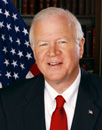 The Food and Energy Security Act of 2007 passed by the Senate last week includes increased funding for alternative energy sources.
The Food and Energy Security Act of 2007 passed by the Senate last week includes increased funding for alternative energy sources.
“I’m particularly excited about the energy title,” said Senator Saxby Chambliss (R-GA), ranking Republican on the Senate Ag Committee. “The energy title gives farmers in my part of the country an opportunity to participate in alternative energy, ethanol and biodiesel, like we’ve never had before.”
The energy title provides investments in farm-based energy by creating initiatives with financial incentives to help farmers transition into biomass crops, and supports the construction of biorefineries from cellulose ethanol with a loan guarantee program that will provide up to 80 percent of total project cost with a loan cap of $250 million. The bill expands markets for biobased products, and invests in farm-based energy R&D, and in helping farmers, ranchers and rural small businesses move to renewable energy and energy efficiency.



 “We are excited about the opportunity to help showcase the advances being made in biofuels and the role they can play in the effort to reduce our nation’s reliance on petroleum,” said Paul Schickler, Pioneer president and DuPont vice president and general manager.
“We are excited about the opportunity to help showcase the advances being made in biofuels and the role they can play in the effort to reduce our nation’s reliance on petroleum,” said Paul Schickler, Pioneer president and DuPont vice president and general manager. A new message accompanies the ice resurfacing machine at University of Minnesota hockey games. The new “E85 Zamboni” debuted this month during a game between the Gopher Men and the University of Alaska-Anchorage.
A new message accompanies the ice resurfacing machine at University of Minnesota hockey games. The new “E85 Zamboni” debuted this month during a game between the Gopher Men and the University of Alaska-Anchorage.  The
The  About 55,000 students in the Philadelphia area will be riding to school on more than 500 buses fueled with biodiesel starting next year.
About 55,000 students in the Philadelphia area will be riding to school on more than 500 buses fueled with biodiesel starting next year. Diane Herrin, a West Chester mother of two, founded Moms for the Future with a few other mothers as an advocacy group. Environmental issues top the group’s docket at the moment.
Diane Herrin, a West Chester mother of two, founded Moms for the Future with a few other mothers as an advocacy group. Environmental issues top the group’s docket at the moment. National Wind, LLC, a leader in large-scale community-owned wind power projects is getting a boost in its capital from South Dakota-based Harmony Equity Income Fund.
National Wind, LLC, a leader in large-scale community-owned wind power projects is getting a boost in its capital from South Dakota-based Harmony Equity Income Fund. As part of its campaign to educate consumers and the news media, the
As part of its campaign to educate consumers and the news media, the 

 Propel Biodiesel is setting up shop in downtown Seattle, the first biodiesel fueling station in that city’s downtown area.
Propel Biodiesel is setting up shop in downtown Seattle, the first biodiesel fueling station in that city’s downtown area. An aerospace engineer and author thinks the country needs a new direction in energy policy to “break the economic stranglehold that the OPEC oil cartel has on our country.”
An aerospace engineer and author thinks the country needs a new direction in energy policy to “break the economic stranglehold that the OPEC oil cartel has on our country.”